关于拿破仑与希特勒在俄国失败的英文比较
希特勒,拿破仑,斯大林历史英文介绍
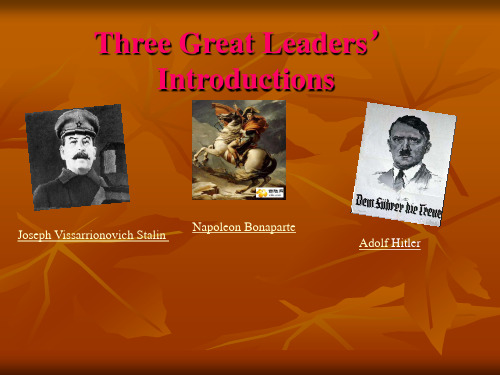
翻译:1804年11月6日,公 民投票通过共和十二年宪 法,法兰西共和国改为法 兰西帝国,拿破仑·波拿 巴为法兰西人的皇帝,称 拿破仑一世。同年12月2日 正式加冕。
1793-1809 years, Britain, Austria, Prussia, the Netherlands, Russia, Denmark, Switzerland, Turkey, Spain, Portugal, countries are participated in five times the law alliance, failed, and napoleon's war self-defense war from into wars of aggression.
翻译:阿道夫· 希特勒,德国人,1921年成为纳 粹党首领,1933年被任命为德国总理,1934年 成为德国元首。他是二战的主要发动者。二战 时,德国势不可挡。然而1942年之后,盟军开 始反攻,德军渐居劣势。1945年德国战败,他 饮弹自杀。
在西欧的战争
On September 1, 1939, Germany against Poland, world war ii began. May 10, 1940 to May 28, ordered the German army invaded the Netherlands, Belgium and Luxembourg. May 13, the German invading France. June 22,, France was forced to signed the document.
翻译பைடு நூலகம்他协助列宁组织和 领导了1917年的十月社会 主义革命。。 1922年至 1952年10月连续当选为党 中央总书记 。
拿破仑战役与希特勒战役的相同点和不同点英语作文

拿破仑战役与希特勒战役的相同点和不同点英语作文First of all, they have a lot in common.First, both of them led their countries to become powerful countries that influenced Europe, and both of them had the desire to unify Europe.Second, both of them have high leadership ability, and they are once highly respected figures in their respective countries.Third, both of them made their deaths to provoke Russia, and finally went to failure step by step.At the same time, there are essential differences between Napoleon and Hitler in many aspects.First, Napoleon is more of a positive figure, while Hitler is the opposite of history.Second, the process of their failure is different.Third, the background of the two times is completely different.Generally speaking, although Napoleon and Hitler are both influential figures, their historical positions are completely different, and the mechanical comparison is of little significance. If it is not necessary to make a forced comparison,we must also stand in their respective historical backgrounds to evaluate their historical positions.首先,两者存在着不少的共同点。
评论拿破仑的英文作文
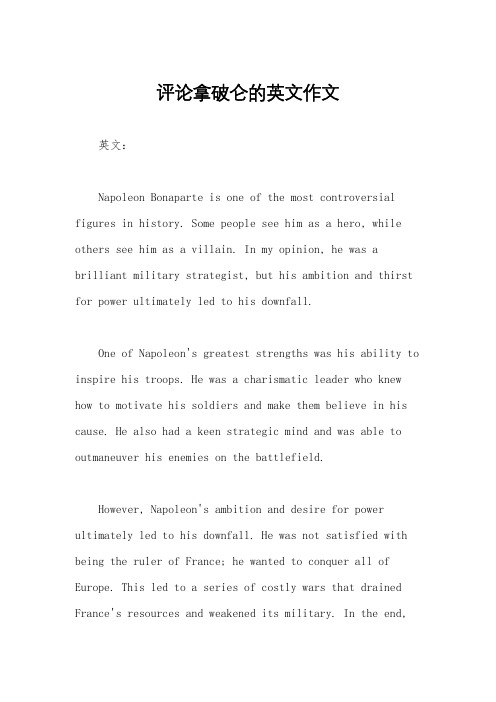
评论拿破仑的英文作文英文:Napoleon Bonaparte is one of the most controversial figures in history. Some people see him as a hero, while others see him as a villain. In my opinion, he was a brilliant military strategist, but his ambition and thirst for power ultimately led to his downfall.One of Napoleon's greatest strengths was his ability to inspire his troops. He was a charismatic leader who knew how to motivate his soldiers and make them believe in his cause. He also had a keen strategic mind and was able to outmaneuver his enemies on the battlefield.However, Napoleon's ambition and desire for power ultimately led to his downfall. He was not satisfied with being the ruler of France; he wanted to conquer all of Europe. This led to a series of costly wars that drained France's resources and weakened its military. In the end,Napoleon was defeated and exiled to the island of Saint Helena.Despite his flaws, Napoleon's legacy is still felt today. He introduced many reforms in France, such as the Napoleonic Code, which laid the foundation for modern civil law. He also left his mark on Europe, as many of the countries he conquered still bear the imprint of French culture and language.中文:拿破仑·波拿巴是历史上最具争议的人物之一。
拿破仑和希特勒的区别英语作文

拿破仑和希特勒的区别英语作文Napoleon and Hitler: A Study in ContrastsThe names Napoleon Bonaparte and Adolf Hitler are two of the most infamous figures in history, each leaving an indelible mark on the world through their ambition, military prowess, and the profound impact they had on the course of global events. While both men were driven by a desire for power and the expansion of their respective empires, a closer examination reveals striking differences between the two that extend far beyond the eras in which they lived.One of the most significant distinctions between Napoleon and Hitler lies in their approach to warfare and military strategy. Napoleon, a brilliant tactician and strategist, was known for his ability to outmaneuver his opponents on the battlefield. He possessed a deep understanding of the principles of warfare, and his campaigns were characterized by bold, decisive actions that often caught his enemies off guard. Napoleon's military victories were the result of careful planning, the effective deployment of his troops, and a keen sense of timing. He was a master of the art of surprise, using deception and unorthodox tactics to gain the upper hand.In contrast, Hitler's military strategy was often haphazard and reactionary, driven more by his own personal biases and ideological beliefs than by sound military principles. While he surrounded himself with capable generals, Hitler frequently overruled their advice, insisting on implementing his own flawed plans. This led to a series of disastrous military decisions, such as the invasion of the Soviet Union, which ultimately contributed to the downfall of the Third Reich.Another key difference between the two men lies in their political and ideological motivations. Napoleon, while undoubtedly a ruthless and ambitious ruler, was primarily driven by a desire to expand the power and influence of the French Empire. He sought to establish France as the dominant force in Europe, and his campaigns were often driven by pragmatic considerations rather than rigid ideological beliefs.In contrast, Hitler's actions were fundamentally shaped by his virulent antisemitism and his belief in the superiority of the Aryan race. The Holocaust, the systematic murder of millions of Jews and other minority groups, was a central tenet of Nazi ideology and a key component of Hitler's vision for a racially "pure" Germany. This ideological fanaticism set Hitler apart from Napoleon, whose own political and military ambitions, while undoubtedly ruthless, were not rooted in the same level of racial hatred and genocidal intent.Another striking difference between the two men is their approachto governance and the treatment of their subjects. Napoleon, while an absolute ruler, was known for his efforts to modernize and reform the French state, introducing a number of progressive policies that improved the lives of his citizens. He established a system of meritocracy, where individuals could advance based on their abilities rather than their social status, and he also implemented reforms to the legal system and the education system.In contrast, Hitler's rule was marked by a brutal and oppressive regime that sought to control every aspect of German society. The Nazi government was characterized by a rigid hierarchy, a cult of personality, and a complete disregard for individual rights and liberties. The systematic persecution of Jews, political dissidents, and other "undesirable" groups was a hallmark of the Third Reich, and the regime's actions were often driven by a desire for total control and the elimination of perceived threats to its power.Finally, the legacies of the two men are markedly different. Napoleon, despite his many conquests and the brutality of some of his actions, is often remembered as a transformative figure who left an enduring impact on the political and social landscape of Europe. His reforms and innovations, such as the Napoleonic Code, continue to influence legal systems and governance structures around the world.In contrast, Hitler's legacy is one of unspeakable horror and human tragedy. The atrocities committed by the Nazi regime, including the Holocaust, have left an indelible stain on the human conscience, and the ramifications of Hitler's actions continue to be felt in the present day. While he may have achieved temporary military successes, his legacy is ultimately one of destruction, oppression, and the devastating consequences of unchecked ambition and ideological fanaticism.In conclusion, while Napoleon and Hitler were both powerful and influential figures in history, the stark differences between them serve to highlight the complex and multifaceted nature of human ambition and the profound impact that individual leaders can have on the course of world events. By examining the contrasts between these two men, we gain a deeper understanding of the complexities of power, the dangers of unchecked ideology, and the enduring legacy that great leaders can leave behind.。
评价拿破仑的英语作文

评价拿破仑的英语作文Napoleon Bonaparte was a military and political leader who rose to prominence during the latter stages of the French Revolution. His impact on European history is undeniable, and his legacy continues to be a subject of debate among historians. In this essay, we will evaluate Napoleon's contributions and his influence on the world.Military Genius: Napoleon's military genius is perhaps his most notable attribute. He revolutionized warfare with his innovative tactics and strategies. His use of the corps system allowed for greater flexibility and speed on the battlefield. His victories at Austerlitz and Jena-Auerstedt are testament to his strategic brilliance.Political Reformer: Beyond his military prowess, Napoleon was a reformer who sought to modernize France. He established the Napoleonic Code, which became a model for legal systems around the world. It emphasized the importance of clear laws and the protection of individual rights.Ambition and Expansion: Napoleon's ambition led to the expansion of France's borders. His conquests spread French influence across Europe, but also led to a series of warsthat exhausted the continent. His invasion of Russia in 1812 was a turning point, resulting in a disastrous defeat that weakened his empire.Dictatorial Rule: While Napoleon brought about many positive reforms, his rule was also marked by authoritarianism. He centralized power and suppressed dissent, which led to the loss of the initial ideals of the French Revolution.Cultural Impact: Napoleon's influence extended beyondpolitics and warfare. He patronized the arts and sciences, fostering a cultural renaissance in France. His support for education and the sciences helped to advance knowledge and culture.Legacy: Napoleon's legacy is complex. He was a visionary who brought about significant changes, but his actions also led to widespread conflict and suffering. His life serves as a reminder of the dual nature of power and the importance of balancing ambition with responsibility.In conclusion, Napoleon Bonaparte was a figure of immense historical significance. His military achievements, political reforms, and cultural contributions have left a lasting impact. However, his ambition and authoritarian rule also highlight the potential dangers of unchecked power. As we reflect on his life and deeds, it is essential to consider the broader implications of his actions and the lessons they offer for the present and future.。
拿破仑和希特勒英文简介
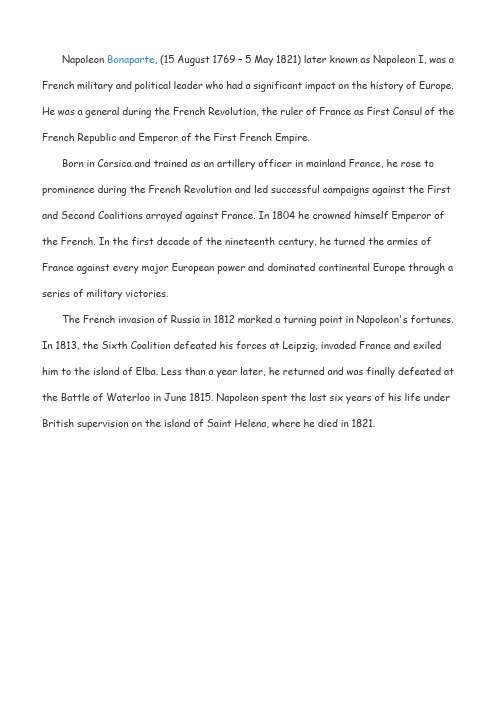
Napoleon Bonaparte, (15 August 1769 – 5 May 1821) later known as Napoleon I, was a French military and political leader who had a significant impact on the history of Europe. He was a general during the French Revolution, the ruler of France as First Consul of the French Republic and Emperor of the First French Empire.Born in Corsica and trained as an artillery officer in mainland France, he rose to prominence during the French Revolution and led successful campaigns against the First and Second Coalitions arrayed against France. In 1804 he crowned himself Emperor of the French. In the first decade of the nineteenth century, he turned the armies of France against every major European power and dominated continental Europe through a series of military victories.The French invasion of Russia in 1812 marked a turning point in Napoleon's fortunes. In 1813, the Sixth Coalition defeated his forces at Leipzig, invaded France and exiled him to the island of Elba. Less than a year later, he returned and was finally defeated at the Battle of Waterloo in June 1815. Napoleon spent the last six years of his life under British supervision on the island of Saint Helena, where he died in 1821.Adolf Hitler was born on 20th April, 1889, in the small Austrian town of Braunau near the German border. Both Hitler's parents had come from poor peasant families. His father Alois Hitler, the illegitimate son of a housemaid, was an intelligent and ambitious man and later became a senior customs official.Hitler did extremely well at primary school and it appeared he had a bright academic future in front of him. He was also popular with other pupils and was much admired for leadership qualities. He was also a deeply religious child and for a while considered the possibility of becoming a monk.Hitler gained power in a Germany facing crises after World War I. He used charismatic oratory and propaganda, appealing to economic need, nationalism and anti-Semitism to establish an authoritarian regime. With a restructured economy and rearmed military, Hitler pursued an aggressive foreign policy with the intention of expanding German Lebensraum and triggered the European theater of World War II by invading Poland. At the height of their power, Germany and the Axis Powers occupied much of Europe, but they eventually were defeated by the Allies. By then, Hitler's racial policies had culminated, with Hitler's knowledge, in the genocide of 11 million people, including about 6 million Jews, in what is now known as the Holocaust.In the final days of the war, Hitler committed suicide in his underground bunker in Berlin, together with his newly wed wife, Eva Braun. The Third Reich which he proclaimed would last a thousand years collapsed in only twelve.。
english4大学英语四级
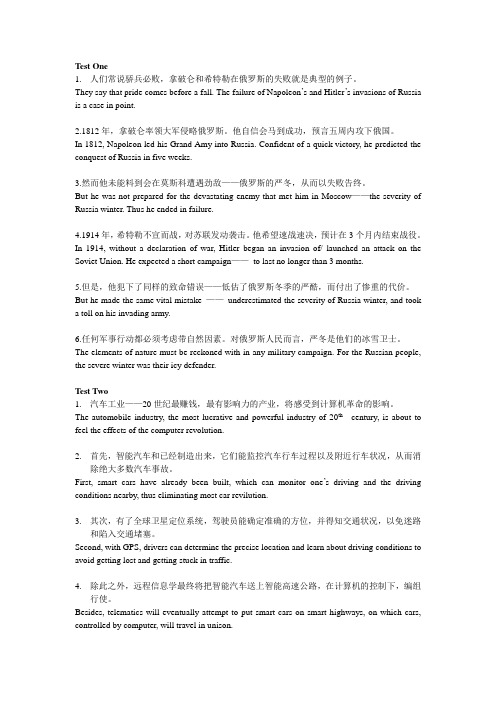
Test One1.人们常说骄兵必败,拿破仑和希特勒在俄罗斯的失败就是典型的例子。
They say that pride comes before a fall. The failure of Napoleon’s and Hitler’s invasions of Russia is a case in point.2.1812年,拿破仑率领大军侵略俄罗斯。
他自信会马到成功,预言五周内攻下俄国。
In 1812, Napoleon led his Grand Amy into Russia. Confident of a quick victory, he predicted the conquest of Russia in five weeks.3.然而他未能料到会在莫斯科遭遇劲敌——俄罗斯的严冬,从而以失败告终。
But he was not prepared for the devastating enemy that met him in Moscow——the severity of Russia winter. Thus he ended in failure.4.1914年,希特勒不宣而战,对苏联发动袭击。
他希望速战速决,预计在3个月内结束战役。
In 1914, without a declaration of war, Hitler began an invasion of/ launched an attack on the Soviet Union. He expected a short campaign——to last no longer than 3 months.5.但是,他犯下了同样的致命错误——低估了俄罗斯冬季的严酷,而付出了惨重的代价。
But he made the same vital mistake ——underestimated the severity of Russia winter, and took a toll on his invading army.6.任何军事行动都必须考虑带自然因素。
关于拿破仑与希特勒对苏联作战失败的原因
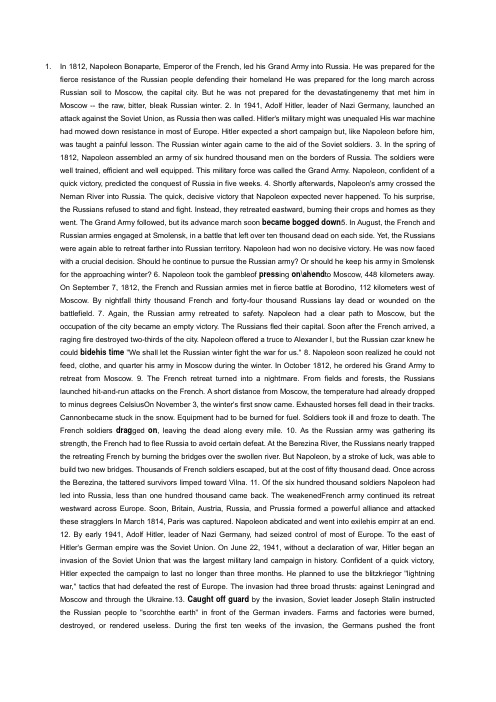
1. In 1812, Napoleon Bonaparte, Emperor of the French, led his Grand Army into Russia. He was prepared for thefierce resistance of the Russian people defending their homeland He was prepared for the long march across Russian soil to Moscow, the capital city. But he was not prepared for the devastatingenemy that met him in Moscow -- the raw, bitter, bleak Russian winter. 2. In 1941, Adolf Hitler, leader of Nazi Germany, launched an attack against the Soviet Union, as Russia then was called. Hitler's military might was unequaled His war machine had mowed down resistance in most of Europe. Hitler expected a short campaign but, like Napoleon before him, was taught a painful lesson. The Russian winter again came to the aid of the Soviet soldiers. 3. In the spring of 1812, Napoleon assembled an army of six hundred thousand men on the borders of Russia. The soldiers were well trained, efficient and well equipped. This military force was called the Grand Army. Napoleon, confident of a quick victory, predicted the conquest of Russia in five weeks. 4. Shortly afterwards, Napoleon's army crossed the Neman River into Russia. The quick, decisive victory that Napoleon expected never happened. To his surprise, the Russians refused to stand and fight. Instead, they retreated eastward, burning their crops and homes as they went. The Grand Army followed, but its advance march soon became bogged down5. In August, the French and Russian armies engaged at Smolensk, in a battle that left over ten thousand dead on each side. Yet, the Russians were again able to retreat farther into Russian territory. Napoleon had won no decisive victory. He was now faced with a crucial decision. Should he continue to pursue the Russian army? Or should he keep his army in Smolensk for the approaching winter? 6. Napoleon took the gambleof press ing on\ahend to Moscow, 448 kilometers away.On September 7, 1812, the French and Russian armies met in fierce battle at Borodino, 112 kilometers west of Moscow. By nightfall thirty thousand French and forty-four thousand Russians lay dead or wounded on the battlefield. 7. Again, the Russian army retreated to safety. Napoleon had a clear path to Moscow, but the occupation of the city became an empty victory. The Russians fled their capital. Soon after the French arrived, a raging fire destroyed two-thirds of the city. Napoleon offered a truce to Alexander I, but the Russian czar knew he could bidehis time "We shall let the Russian winter fight the war for us." 8. Napoleon soon realized he could not feed, clothe, and quarter his army in Moscow during the winter. In October 1812, he ordered his Grand Army to retreat from Moscow. 9. The French retreat turned into a nightmare. From fields and forests, the Russians launched hit-and-run attacks on the French. A short distance from Moscow, the temperature had already dropped to minus degrees CelsiusOn November 3, the winter's first snow came. Exhausted horses fell dead in their tracks.Cannonbecame stuck in the snow. Equipment had to be burned for fuel. Soldiers took ill and froze to death. The French soldiers drag ged on, leaving the dead along every mile. 10. As the Russian army was gathering its strength, the French had to flee Russia to avoid certain defeat. At the Berezina River, the Russians nearly trapped the retreating French by burning the bridges over the swollen river. But Napoleon, by a stroke of luck, was able to build two new bridges. Thousands of French soldiers escaped, but at the cost of fifty thousand dead. Once across the Berezina, the tattered survivors limped toward Vilna. 11. Of the six hundred thousand soldiers Napoleon had led into Russia, less than one hundred thousand came back. The weakenedFrench army continued its retreat westward across Europe. Soon, Britain, Austria, Russia, and Prussia formed a powerful alliance and attacked these stragglers In March 1814, Paris was captured. Napoleon abdicated and went into exilehis empirr at an end.12. By early 1941, Adolf Hitler, leader of Nazi Germany, had seized control of most of Europe. To the east ofHitler's German empire was the Soviet Union. On June 22, 1941, without a declaration of war, Hitler began an invasion of the Soviet Union that was the largest military land campaign in history. Confident of a quick victory, Hitler expected the campaign to last no longer than three months. He planned to use the blitzkriegor "lightning war," tactics that had defeated the rest of Europe. The invasion had three broad thrusts: against Leningrad and Moscow and through the Ukraine.13. Caught off guard by the invasion, Soviet leader Joseph Stalin instructed the Russian people to "scorchthe earth" in front of the German invaders. Farms and factories were burned, destroyed, or rendered useless. During the first ten weeks of the invasion, the Germans pushed the fronteastward, and the Russians suffered more than a million casualties 14. In the north, the Germans closed in on Leningrad. Despite great suffering, however, the people of Leningrad refused to surrender. As the battle of Leningrad dragged on into winter, the city's situation became desperate. As food ran out, people died from hunger and disease. By the middle of the winter of 1941-1942, nearly four thousand people starved to death every day. Close to one million people died as a result of the siege 15. In the center of Russia, Hitler's goal was the capture of Moscow. Because the Germans had anticipated a quick victory, they had made no plans for winter supplies. October arrived with heavy rains. "General Mud" slowed down the movement of the Germans' lightning attack. 16. As Hitler's armies drew closer and closer to Moscow, an early, severe winter settled over the Soviet Union, the harshest in years. Temperatures dropped to minus 48 degrees Celsius. Heavy snows fell. The German soldiers, completely unprepared for the Russian winter, froze in their light summer uniforms. The German tanks lay buried in the heavy snowbanks. The Russian winter brought the German offensive to a halt 17. By the summer of 1942, Hitler had launched two new offensives. In the south, the Germans captured Sevastopol. Hitler then pushed east to Stalingrad, a great industrial city that stretched for 48 kilometers along the Volga River. Despite great suffering, Soviet defenders refused to give up Stalingrad. 18. In November 1942, the Russians launched a counterattack With little or no shelter from the winter cold in and around Stalingrad, German troopswere further weakened by a lack of food and supplies. Not until January 1943 did the Germans give up their siege. Of the three hundred thousand Germans attacking Stalingrad, only ninety thousand starving soldiers were left. The loss of the battle for Stalingrad finally turn ed the tide against Hitler. The German victories were over, thanks in part to the Russian winter.19. During 1943 and 1944, the Soviet armies pushed the German front back toward the west. In the north, the Red Army broke the three-year siege of Leningrad with a surprise attack on January 15, 1944. Within two weeks, the heroic survivors of Leningrad saw their invaders depart. By March 1944, the Ukraine farming region was again in Soviet hands. On May 9, 1944, Sevastopol was liberated from the Germans. The Russians were now heading for Berlin. 20. For Hitler, the invasion of the Soviet Union had turned into a military disaster. For the Russian people, it brought unspeakable suffering. The total Soviet dead in World War II reached almost 23 million.21. The elements of nature must be reckoned with in any military campaign. Napoleon and Hitler both underestimated the severity of the Russian winter. Snow, ice, and freezing temperatures took their toll on both invading armies. For the Russian people, the winter was an icy defender.1 I run a manufacturing company with about 350 employees, and I often do the interviewing and hiring myself. I like talking to potential salespeople,becausethey’reourlinktocustomers.2 When a recent college graduate came into my office not too long ago looking for a sales job, I asked him what he had done to prepare for the interview. He said he'd read something about us somewhere.3 Had he called anyone at Mackay Envelope Corporation to find out more about us? No. Had he called our suppliers? Our customers? No.4 Had he checked with his university to see if there were any graduates working at Mackay whom he could interview? Had he asked any friends to grill him in a mock interview? Did he go to the library to find newspaper clippings on us?5 Did he write a letter beforehand to tell us about himself, what he was doing to prepare for the interview and why he'd be right for the job? Was he planning to follow up the interview with another letter indicating his eagernessto join us? Would the letter be in our hands within 24 hours of the meeting, possibly even hand-delivered?6 The answer to every question was the same: no. That left me with only one other question: How well prepared would this person be if he were to call on a prospective customer for us? I already knew the answer. As I see it there are four keys to getting hired:8 1. Prepare to win. "If you miss one day of practice, you notice the difference," the saying goes among musicians. "If you miss two days of practice, the critics notice the difference. If you miss three days of practice, the audience notices the difference."9 When we watch a world-class musician or a top athlete, we don't see the years of preparation that enabled him or her to become great. The Michael Jordans of the world have talent, yes, but they're also the first ones on and the last ones off the basketball court. The same preparation applies in every form of human endeavor If you want the job, you have to prepare to win it.10 When I graduated from college, the odds were good that I would have the same job for the rest of my life. And that's how it worked out. But getting hired is no longer a once-in-a-lifetime experience. Employment experts believe that today's graduates could face as many as ten job changes during their careers.11That may sound like a lot of pressure. But if you're prepared, the pressure is on the other folks -- the ones who haven't done their homework 12 You won't get every job you go after. The best salespeople don't close every sale. Michael Jordan makes barely half of his field-goal attempts. But it takes no longer to prepare well for one interview than to wander in half-preparedfor five. And your prospects for success will be many times better. 2. Never stop learning. Recently I played a doubles tennis match paired with a 90-year-old. I wondered how things would work out; I shouldn't have. We hammered our opponents 6-1, 6-1!14 As we were switching sides to play a third set, he said to me, "Do you mind if I play the backhand court? I always like to work on my weaknesses." What a fantastic example of a person who has never stopped learning. Incidentally, we won the third set 6-1.15 As we walked off the court, my 90-year-old partnerchuckled and said, "I thought you'd like to know about my number-one ranking in doubles in the United States in my age bracket85 and up!" He wasn't thinking 90; he wasn't even thinking 85. He was thinking number one. You can do the same if you work on your weaknesses and develop your strengths. To be able to compete, you've got to keep learning all your life. 3. Believe in yourself, even when no one else does. Do you remember the four-minute mile? Athletes had been trying to do it for hundreds of years and finally decided it was physically impossible for humans. Our bone structure was all wrong, our lung power inadequate. Then one human proved the experts wrong. And, miracle of miracles, six weeks after Roger Bannister broke the four-minute mile, John Landy beat Bannister's time by nearly two full seconds. Since then, close to eight hundred runners have broken the four-minute mileSeveral years ago my daughter Mimi and I took a crack at runningthe New York Marathon. At the gun, 23,000 runners started -- and 21,244 finished. First place went to a Kenyanwho completed the race in two hours, 11 minutes and one second. The 21,244th runner to finish was a Vietnam veteran. He did it in three days, nine hours and 37 minutes. With no legs, he covered 26.2 miles. After my daughter and I passed him in the first few minutes, we easily found more courage to finish ourselves Don't ever let anyone tell you that you can't accomplish your goals. Who says you're not tougher, harder working and more able than your competition? You see, a goal is a dream with a deadline: in writing, measurable, identifiable attainable. 4. Find a way to make a difference. In my opinion, the majority of New York cabdrivers are unfriendly, if not downrightrude. Most of the cabs are filthy, and almost all of them sportan impenetrable, bulletproof partition. But recently I jumped into a cab at LaGuardia Airport and guess what? It was clean. There was beautiful music playing and no partition "Park Lane Hotel, please," I said to the driver. With a broad smile, he said, "Hi, my name is Wally," and he handed me a mission statement. A mission statement! It said he would get me there safely, courteously and on time As we drove off, he held up a choice of newspapers and said, "Be my guest." He told me to help myself to the fruit in the basket on the back seat. He held up a cellular phone and said, "It's a dollar a minute if you'd like to make a call.Shocked, I blurted, "How long have you been practicing this?" He answered, "Three or four years. "I know this is prying" I said, "but how much extra money do you earn in tips? "Between $12,000 and $14,000 a year!" he responded proudly.He doesn't know it, but he's my hero. He's living proof that you can always shift the odds in your favor.My mentor, Curt Carlson, is the wealthiest man in Minnesota, owner of a hotel and travel company with sales in the neighborhood of $9 billion. I had to get to a meeting in New York one day, and Curt generously offered me a ride in his jet. It happened to be a day Minnesota was hit with one of the worst snowstorms in years. Minneapolis-St. Paul International Airport was closed for the first time in decades.Then, though the storm continued to pound us, the airport opened a runway for small craft only. As we were taxiing down it to take off, Curt turned to me and said gleefully, "Look, Harvey, no tracks in the snow!"Curt Carlson, 70 years old at the time, rich beyond anyone's dreams, could still sparkle with excitement about being first From my standpoint that's what it's all about. Prepare to win. Never stop learning. Believe in yourself, even when no one else does. Find a way to make a difference. Then go out and make your own tracks in the snow.。
拿破仑希特勒对比英文作文
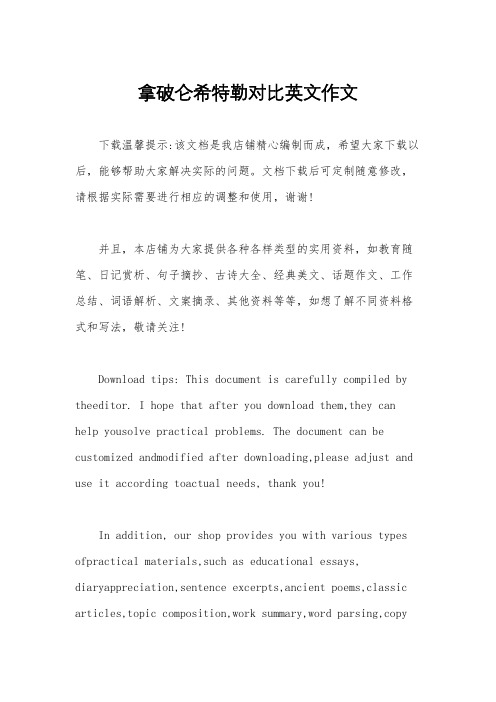
拿破仑希特勒对比英文作文下载温馨提示:该文档是我店铺精心编制而成,希望大家下载以后,能够帮助大家解决实际的问题。
文档下载后可定制随意修改,请根据实际需要进行相应的调整和使用,谢谢!并且,本店铺为大家提供各种各样类型的实用资料,如教育随笔、日记赏析、句子摘抄、古诗大全、经典美文、话题作文、工作总结、词语解析、文案摘录、其他资料等等,如想了解不同资料格式和写法,敬请关注!Download tips: This document is carefully compiled by theeditor. I hope that after you download them,they can help yousolve practical problems. The document can be customized andmodified after downloading,please adjust and use it according toactual needs, thank you!In addition, our shop provides you with various types ofpractical materials,such as educational essays, diaryappreciation,sentence excerpts,ancient poems,classic articles,topic composition,work summary,word parsing,copyexcerpts,other materials and so on,want to know different data formats andwriting methods,please pay attention!Napoleon was a great military leader. He had amazing strategies and led his army to many victories.Hitler was a very different kind of person. He brought great disaster and harm to the world.Napoleon is remembered for his conquests and reforms. He had a big impact on European history.Hitler's actions were full of evil and destruction. His ideology was extremely harmful.Napoleon had his flaws, but he also had some achievements.Hitler's name is associated with horror and atrocities. There is no excuse for what he did.。
拿破仑希特勒对比英文作文
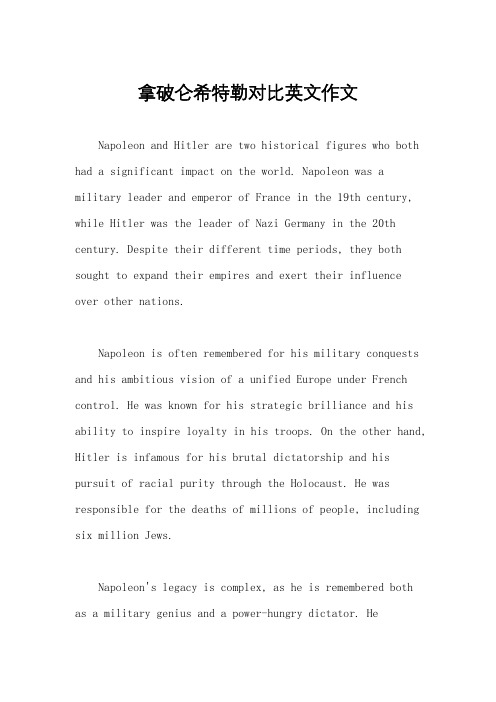
拿破仑希特勒对比英文作文Napoleon and Hitler are two historical figures who both had a significant impact on the world. Napoleon was amilitary leader and emperor of France in the 19th century, while Hitler was the leader of Nazi Germany in the 20th century. Despite their different time periods, they both sought to expand their empires and exert their influence over other nations.Napoleon is often remembered for his military conquests and his ambitious vision of a unified Europe under French control. He was known for his strategic brilliance and his ability to inspire loyalty in his troops. On the other hand, Hitler is infamous for his brutal dictatorship and his pursuit of racial purity through the Holocaust. He was responsible for the deaths of millions of people, including six million Jews.Napoleon's legacy is complex, as he is remembered both as a military genius and a power-hungry dictator. Heimplemented numerous reforms in France, such as the Napoleonic Code, which had a lasting impact on European legal systems. In contrast, Hitler's legacy is overwhelmingly negative, as he is synonymous with the atrocities of World War II and the Holocaust.Despite their differing legacies, both Napoleon and Hitler were able to rise to power through their charisma and ability to manipulate public opinion. They bothutilized propaganda to spread their ideologies and gain support for their agendas. However, Napoleon's reign was characterized by a more stable and prosperous Europe, while Hitler's rule led to widespread destruction and suffering.In conclusion, while both Napoleon and Hitler left a lasting impact on history, their legacies are vastly different. Napoleon is remembered for his military conquests and legal reforms, while Hitler is reviled for his brutal dictatorship and the atrocities committed under his rule. Despite their differences, they both serve as cautionary tales of the dangers of unchecked power and the devastating consequences of tyranny.。
全新版大学英语综合教程第四册课文翻译及习题答案(上海外语教育出版
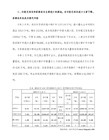
Chinese Translations of Texts A(Units 1-8)参考译文第一单元与自然力量抗争课文A????人道是骄兵必败。
就拿拿破仑和希特勒两人来说吧,他们所向披靡,便以为自己战无不胜,不可阻挡。
但俄罗斯的冰雪卫士证明他们错了。
冰雪卫士奈拉·B·斯密斯????1812年,法国皇帝拿破仑·波拿巴率大军入侵俄罗斯。
他准备好俄罗斯人民会为保卫祖国而奋勇抵抗。
他准备好在俄罗斯广袤的国土上要经过长途跋涉才能进军首都莫斯科。
但他没有料到在莫斯科他会遭遇劲敌——俄罗斯阴冷凄苦的寒冬。
1941年,纳粹德国元首阿道夫·希特勒进攻当时被称作苏联的俄罗斯。
希特勒的军事实力堪称无敌。
他的战争机器扫除了欧洲绝大部分地区的抵抗。
希特勒希望速战速决,但是,就像在他之前的拿破仑一样,他得到的是痛苦的教训。
仍是俄罗斯的冬天助了苏维埃士兵一臂之力。
拿破仑发起的战役????1812年春,拿破仑在俄国边境屯兵60万。
这些士兵受过良好训练,作战力强,装备精良。
这支军队被称为大军。
拿破仑对马到成功充满自信,预言要在5个星期内攻下俄国。
????不久,拿破仑的大军渡过涅曼河进入俄国。
拿破仑期盼着的速决速胜迟迟没有发生。
令他吃惊的是,俄国人并不奋起抵抗。
相反,他们一路东撤,沿途焚毁庄稼和民居。
大军紧追不舍,但它的长驱直入很快由于粮草运输缓慢而停顿下来。
????到了8月,法俄两军在斯摩棱斯克交战,这一战役中,双方各有上万人阵亡。
可是,俄国人仍能在自己的国土上继续后撒。
拿破仑未能取得决定性的胜利。
此刻他面临着一个重要抉择。
是继续追击俄国,军队,还是把军队驻扎在斯摩棱斯克,在那儿度过将到的冬天? ????拿破仑孤注一掷,决定向远在448公里之外的莫斯科进发。
1812年9月7日,法俄两军在莫斯科以西112公里外的鲍罗季诺激战。
夜幕降临时,3万名法国士兵以及4万4千名俄国士兵或伤或亡,倒在了战场上。
英语句子

Unit one1.拿破仑没有想到在莫斯科会遭遇劲敌-俄罗斯阴冷凄苦的寒冬, 从而以失败告终。
Napoleon was not prepared for the devastating enemy that met him in Moscow –the raw, bitter, bleak Russian winter.2. 希特勒的军事实力堪称无敌。
他的战争机器扫除了欧洲绝大部分地区的抵抗Hitler’s military might was unequaled. His war machine had mowed down resistance in most of Europe.3. 希特勒希望速战速决,但像前面的拿破仑一样,也得到了惨痛的教训。
俄罗斯的冬季又助了苏联士兵的一臂之力。
Hitler expected a short campaign but, like Napoleon before him, was taught a painful lesson. The Russian winter again came to the aid of the Soviet soldiers. 4. 1812年春,拿破仑在俄国边境屯兵60万。
In the spring of 1812, Napoleon assembled an army of six hundred thousand men on the borders of Russia.5. 拿破仑对马到成功充满信心,预言要在5个星期内攻下俄国. Napoleon, confident of a quick victory, predicted the conquest of Russia in five weeks.6. 大军紧追不舍,但它的长驱直入很快由于粮草运输缓慢而停顿下来.The Grand Army followed, but its advance march soon became bogged down by slow-moving supply lines.7. 到了8月,法俄两军在斯摩棱斯克交战,这一战役中,双方各有上万人阵亡。
希特勒与拿破仑_英文对比
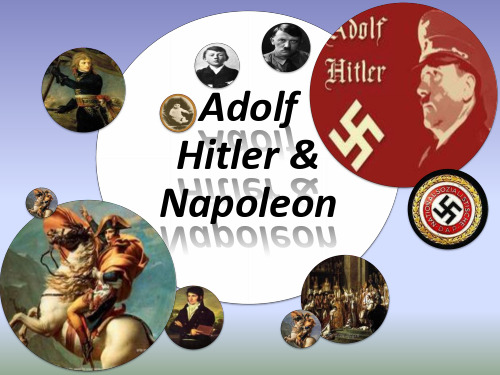
1923.11
The Beer Hall Putsch(啤酒馆暴动)--arrested---My Struggle
19191921
1914.8
The First World War--Join the army
Entering the German Workers’ Party---became a leader--- the National Socialist Germen Workers’ Party
forces at
Leipzig
The French
invasion of
Russia in
1812
Under British supervision the island of Saint Helena he died in 1821
Comments:
Strategist
Politician
Presented the big bourgeoisie
Character
1) Self-abased: nose appearance
2) Double character: cruel sensitive
3) Bad-tempered
Napoleon Bonaparte
a small island nation
ruled over 70 million people
Adolf Hitler & Napoleon
Contents:
Hitler Brief story
Our views
Napol-
eon Brief story
Our opinion
Comparison
Ten days after Hitler’s 56th birthday
评价拿破仑英语作文初二
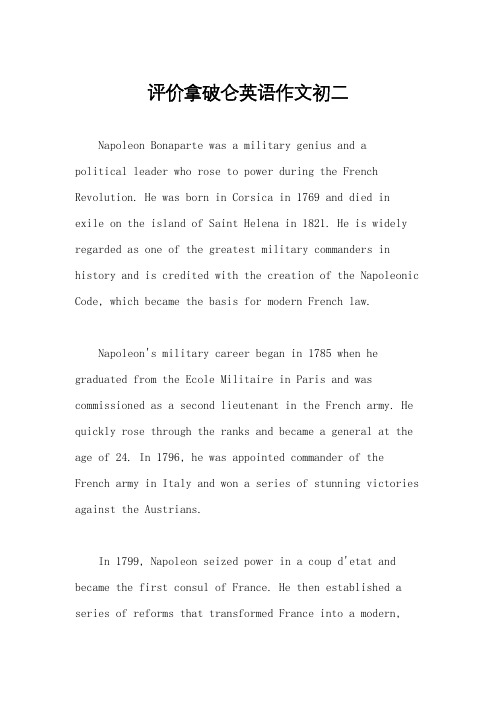
评价拿破仑英语作文初二Napoleon Bonaparte was a military genius and apolitical leader who rose to power during the French Revolution. He was born in Corsica in 1769 and died inexile on the island of Saint Helena in 1821. He is widely regarded as one of the greatest military commanders in history and is credited with the creation of the Napoleonic Code, which became the basis for modern French law.Napoleon's military career began in 1785 when he graduated from the Ecole Militaire in Paris and was commissioned as a second lieutenant in the French army. He quickly rose through the ranks and became a general at the age of 24. In 1796, he was appointed commander of the French army in Italy and won a series of stunning victories against the Austrians.In 1799, Napoleon seized power in a coup d'etat and became the first consul of France. He then established a series of reforms that transformed France into a modern,centralized state. He also launched a series of military campaigns that expanded the French Empire to its greatest extent, including the conquest of Egypt, Italy, and much of Europe.Napoleon's military genius was based on his ability to use speed, surprise, and concentration of force to defeat his enemies. He also had a keen understanding of logistics and was able to supply his armies with food, ammunition, and other essentials even in the most difficult circumstances.Despite his many accomplishments, Napoleon's legacy is controversial. Some see him as a hero who brought order and progress to France, while others view him as a tyrant who caused countless deaths and suffering. Regardless of one's opinion, there is no denying the impact that Napoleon had on the world. His military tactics and political ideas continue to influence leaders and scholars to this day.In conclusion, Napoleon Bonaparte was a complex and controversial figure who played a significant role inFrench and European history. His military genius and political leadership continue to be studied and debated by scholars and historians around the world. Whether he was a hero or a villain, there is no denying that Napoleon left an indelible mark on the world and his legacy continues to be felt to this day.。
拿破仑进攻俄国英文作文
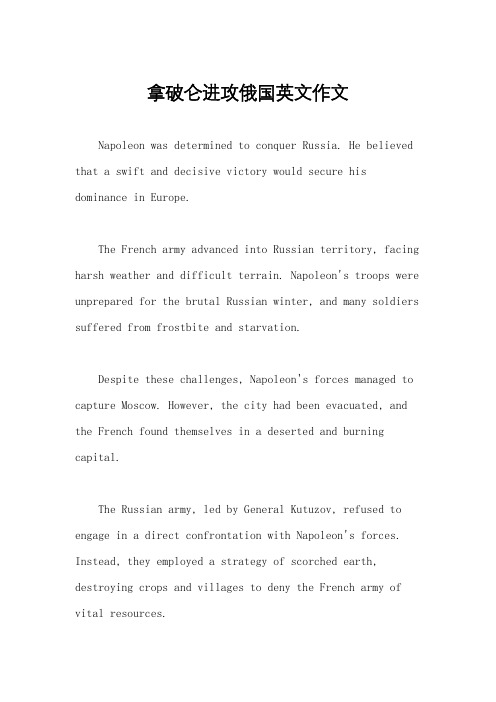
拿破仑进攻俄国英文作文Napoleon was determined to conquer Russia. He believed that a swift and decisive victory would secure his dominance in Europe.The French army advanced into Russian territory, facing harsh weather and difficult terrain. Napoleon's troops were unprepared for the brutal Russian winter, and many soldiers suffered from frostbite and starvation.Despite these challenges, Napoleon's forces managed to capture Moscow. However, the city had been evacuated, and the French found themselves in a deserted and burning capital.The Russian army, led by General Kutuzov, refused to engage in a direct confrontation with Napoleon's forces. Instead, they employed a strategy of scorched earth, destroying crops and villages to deny the French army of vital resources.As winter set in, Napoleon realized that his campaign was doomed. His army, weakened by the harsh conditions and constant skirmishes with the Russian forces, began a long and arduous retreat from Moscow.The retreat turned into a disaster, as the French soldiers suffered heavy casualties from Russian attacks and the brutal cold. Napoleon's once mighty army was decimated, and his ambitions of conquering Russia were shattered.。
评价拿破仑英语作文初一
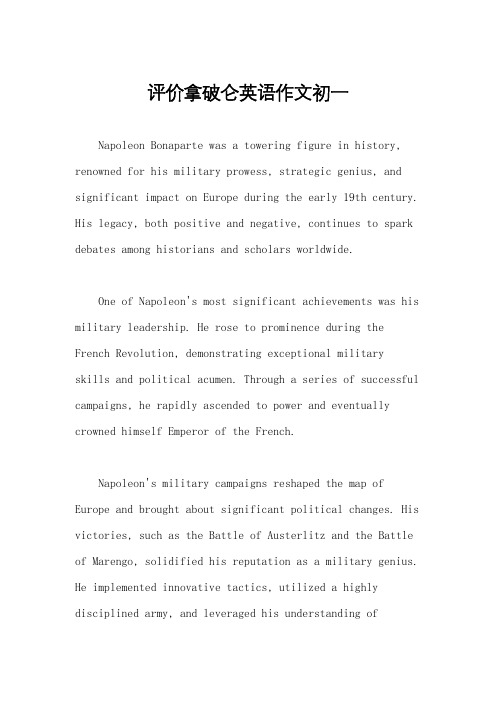
评价拿破仑英语作文初一Napoleon Bonaparte was a towering figure in history, renowned for his military prowess, strategic genius, and significant impact on Europe during the early 19th century. His legacy, both positive and negative, continues to spark debates among historians and scholars worldwide.One of Napoleon's most significant achievements was his military leadership. He rose to prominence during the French Revolution, demonstrating exceptional militaryskills and political acumen. Through a series of successful campaigns, he rapidly ascended to power and eventually crowned himself Emperor of the French.Napoleon's military campaigns reshaped the map of Europe and brought about significant political changes. His victories, such as the Battle of Austerlitz and the Battle of Marengo, solidified his reputation as a military genius. He implemented innovative tactics, utilized a highly disciplined army, and leveraged his understanding ofgeography to outmaneuver his opponents.Moreover, Napoleon implemented several reforms that left a lasting impact on the countries he conquered. He introduced legal reforms, including the Napoleonic Code, which standardized laws across his empire and promoted equality before the law. Additionally, he initiated educational and infrastructure projects, contributing to the modernization of various regions under his rule.However, Napoleon's ambitions also led to widespread conflict and suffering. His quest for hegemony resulted in devastating wars that claimed countless lives and caused immense destruction across Europe. The Napoleonic Wars, which spanned over a decade, brought about political instability and economic hardship in many countries.Furthermore, Napoleon's authoritarian rule and expansionist policies sparked resistance movements and fueled nationalist sentiments across Europe. His attempts to impose French dominance and suppress local identities led to resentment among conquered peoples and ultimatelycontributed to his downfall.In 1815, Napoleon suffered a decisive defeat at the Battle of Waterloo, marking the end of his reign and the Napoleonic era. He was exiled to the remote island of Saint Helena, where he spent the remaining years of his life in captivity until his death in 1821.Overall, Napoleon Bonaparte's legacy remains a subject of debate and fascination. While he is celebrated for his military brilliance and administrative reforms, his aggressive pursuit of power and disregard for human life also raise moral and ethical questions. Ultimately, Napoleon's complex legacy serves as a reminder of the complexities of history and the enduring impact of individuals on the world stage.。
评价拿破仑 英语作文
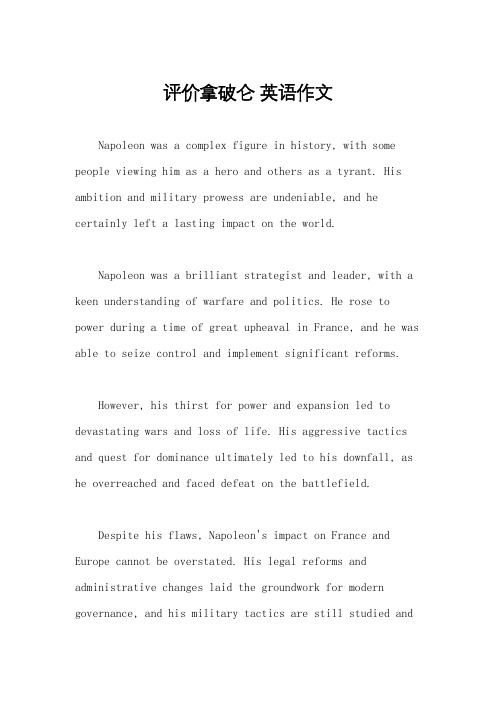
评价拿破仑英语作文Napoleon was a complex figure in history, with some people viewing him as a hero and others as a tyrant. His ambition and military prowess are undeniable, and he certainly left a lasting impact on the world.Napoleon was a brilliant strategist and leader, with a keen understanding of warfare and politics. He rose to power during a time of great upheaval in France, and he was able to seize control and implement significant reforms.However, his thirst for power and expansion led to devastating wars and loss of life. His aggressive tactics and quest for dominance ultimately led to his downfall, as he overreached and faced defeat on the battlefield.Despite his flaws, Napoleon's impact on France and Europe cannot be overstated. His legal reforms and administrative changes laid the groundwork for modern governance, and his military tactics are still studied andadmired today.In conclusion, Napoleon was a figure of great complexity and contradiction. While he achieved great success and left a lasting legacy, his thirst for power and aggressive tactics also brought about great suffering. He is a figure who continues to be debated and analyzed, with no easy answers or conclusions.。
